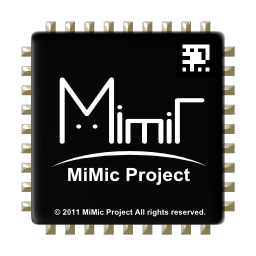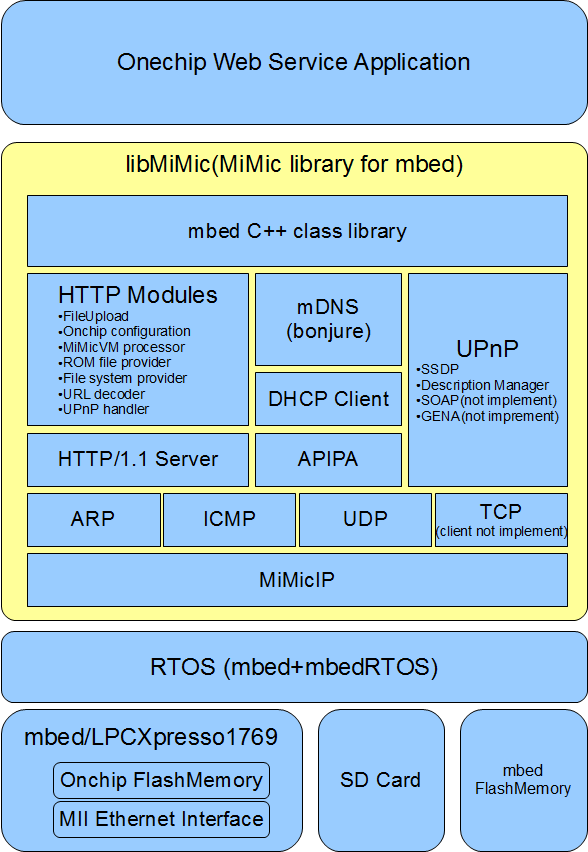This is Webservice SDK for mbed. LPCXpresso1769/LPC1768/FRDM-K64F/LPC4088
Dependents: MbedFileServer_1768MiniDK2 RedWireBridge IssueDebug_gcc MiMicRemoteMCU-for-Mbed ... more

libMiMic(MiMic library for mbed)は、WebService機能を提供するSDKです。 mbedでWebAPIに対応したネットワークデバイスを簡単に作ることが出来ます。
libMiMicはMiMic projectで開発しています。MiMic projectについてはこちらをご覧ください。 http://nyatla.jp/mimic/wp/
構成
libMiMicはmbedRTOS上で動作し、ユーザアプリケーションにAPIを提供します。コアAPIはC言語で記述されていますが、使用頻度の高いものについてはmbed向けのC++APIが準備されています。

※libMiMicはmbedの標準イーサネットドライバをしようしていません。
標準イーサネットドライバと同時に使用することはできません。
- MiMicIP - IPv4スタックです。レテンシとメモリ消費量を抑えたuipベースのライブラリです。
- ARP/ICMP/UDP/TCP - 基礎的なソケットAPIを提供します。APIは独自です。
- HTTP/1.1 Server - HTTP/1.1に対応したサーバです。マルチセッション・Chunked・持続性接続に対応しています。
- HTTP Modules - HTTP/1.1の機能モジュールです。以下のモジュールがあります。
- ROM file provider - ROMに格納したファイルイメージを公開します。
- File system provider - mbedファイルシステムを公開します。
- Onchip configuration - プログラムフラッシュを利用して設定を保存します。
- MiMicVM processor - RPCリクエスト(MiMicVM)を処理します。
- FileUpload - ファイルアップロードを受け取ります。
- URL decoder - HTTPリクエストを解析します。
- UPnP handler -UPnPメッセージを処理します。
- WebSocket - Websocketサーバです。
- mDNS - マルチキャストDNSサービスです。
- UPnP - UPnP/1.0の機能を提供します。UPnP handlerと協調して動作します。(現在はデバイス探索(SSDP)・デスクリプション(Description)のみ実装してあります。)
- DHCP/APIPA - ゼロコンフィギュレーション用のモジュールです。
- HTTP/1.1 Client
- mbed C++ class library - mbed向けのC++CPIです。C言語のものより簡単です。
対応機種
- mbed(mbed LPC1768)
- LPCXpresso1769
プログラム
Import programMiMicRemoteMCU-for-Mbed
MiMic RemoteMCU for mbed. This program provides MCU control API over REST API. It can control MCU from Javascript,PHP or any HTTP rest client directly. And, The application has self development environment.
Import programMbedFileServer
The program publishes files at local directory and SD filesystem. It is a full-fledged webServer somewhat.
サンプル
Import programMiMicSimpleHttpd
This is a simplest HTTP server made of libMiMic. It will echo back a request path.
Import programUPnPBasicDevice
Simplest UPnP basic device example. This program to run UPnP basic device on the mbed.
Import programWebSocketSample
MiMicSDK Websocket module sample program.
Import programHttpClientSamlpe
A http client sample program.
Import programTcpSocketClientSamlpe
MiMicSDK Tcp client socket sample program.
Import programUdpSocketSamlpe
Udp socket sample program. This program will send back the received packet.
チュートリアル
- HTTPD解説
- UPnPデバイスの作り方
- MiMicRemoteMCUの紹介(pdf)
- MiMicRemoteMCUのマニュアル(pdf)
English
libMiMic(MiMic library for mbed) is SDK which provides Webservice functions. It can be created networking device easily using mbed.
See more MiMic information, See MiMic project website. http://nyatla.jp/mimic/wp/
Structure
libMiMic run on mbed RTOS and provides networking API to user application. This library has C++ class API for the mbed, and low-level C language API.

For WebService general, it can be written in a simple C + + API.
libMiMic does not have the standard Ethernet driver of mbed. It is not possible that will be used with the standard Ethernet driver.
- MiMicIP - IPv4 protocol stack. This is based uip which is reduced memory and latency.
- ARP / ICMP / UDP / TCP - Those are provide basic IP protocols.
- HTTP/1.1 Server - The Http server compatible HTTP/1.1. It supports multi-session, chunked transport, persistent connection.
- HTTP Modules - There are addon-module for HTTP server. The following modules.
- ROM file module - Publish the file images in ROM.
- File system module - Publish thefiles in mbed file system.
- Onchip configuration module - To save the network settings to the program flash via REST.
- MiMicVM module - To handle the (MiMicVM) RPC request.
- FileUpload module - Accept a file via HTTP POST.
- URL dedoce module - A versatility URL decoder.
- UPnP handle module - To handle UPnP messages.
- UPnP - This provides UPnP/1.0 device functions. It works together with UPnP handler.
- Websocket - websocket (version13) server
- mDNS Service - DNS-SD protocol server.
- UPnP - This provides UPnP/1.0 device functions which works with UPnP handler. (You have been implemented (SSDP) ? description only (Description) device search now.) It is a module zero configuration for - DHCP / APIPA. mbed C + + class library - C of mbed for + + is the CPI. It is simple than that of the C language.
- DHCP/APIPA - It support zero-cpnfigulation.
- mbed C++ class library. Almost APIs for Web applications are available.
- HTTP/1.1 Client
Supported target
- mbed(mbed LPC1768)
- LPCXpresso1769
Application
Import programMiMicRemoteMCU-for-Mbed
MiMic RemoteMCU for mbed. This program provides MCU control API over REST API. It can control MCU from Javascript,PHP or any HTTP rest client directly. And, The application has self development environment.
Import programMbedFileServer
The program publishes files at local directory and SD filesystem. It is a full-fledged webServer somewhat.
Sample
Import programMiMicSimpleHttpd
This is a simplest HTTP server made of libMiMic. It will echo back a request path.
Import programUPnPBasicDevice
Simplest UPnP basic device example. This program to run UPnP basic device on the mbed.
Import programWebSocketSample
MiMicSDK Websocket module sample program.
Import programHttpClientSamlpe
A http client sample program.
Import programTcpSocketClientSamlpe
MiMicSDK Tcp client socket sample program.
Import programUdpSocketSamlpe
Udp socket sample program. This program will send back the received packet.
Tutorial
- HTTPD hello world.
- How to make own UPnP device.
- MiMicRemoteMCUの紹介(pdf)
- MiMicRemoteMCUのマニュアル(pdf)
core/utils/sha1/sha1.c
- Committer:
- nyatla
- Date:
- 2013-09-13
- Revision:
- 57:bc4330dfa62f
File content as of revision 57:bc4330dfa62f:
/*
SHA-1 in C
By Steve Reid <steve@edmweb.com>
100% Public Domain
Test Vectors (from FIPS PUB 180-1)
"abc"
A9993E36 4706816A BA3E2571 7850C26C 9CD0D89D
"abcdbcdecdefdefgefghfghighijhijkijkljklmklmnlmnomnopnopq"
84983E44 1C3BD26E BAAE4AA1 F95129E5 E54670F1
A million repetitions of "a"
34AA973C D4C4DAA4 F61EEB2B DBAD2731 6534016F
*/
/**
* modified by nyatla
* Still public domain.
*/
/* #define LITTLE_ENDIAN * This should be #define'd if true. */
/* #define SHA1HANDSOFF * Copies data before messing with it. */
#include <stdio.h>
#include <string.h>
#include "sha1.h"
#include "NyLPC_config.h"
# if UIP_BYTE_ORDER == NyLPC_ENDIAN_BIG
# else
# define LITTLE_ENDIAN 1
#endif
/*
void SHA1Transform(unsigned long state[5], unsigned char buffer[64]);
void SHA1Init(SHA1_CTX* context);
void SHA1Update(SHA1_CTX* context, unsigned char* data, unsigned int len);
void SHA1Final(unsigned char digest[20], SHA1_CTX* context);
*/
#define rol(value, bits) (((value) << (bits)) | ((value) >> (32 - (bits))))
/* blk0() and blk() perform the initial expand. */
/* I got the idea of expanding during the round function from SSLeay */
#ifdef LITTLE_ENDIAN
#define blk0(i) (block->l[i] = (rol(block->l[i],24)&0xFF00FF00) \
|(rol(block->l[i],8)&0x00FF00FF))
#else
#define blk0(i) block->l[i]
#endif
#define blk(i) (block->l[i&15] = rol(block->l[(i+13)&15]^block->l[(i+8)&15] \
^block->l[(i+2)&15]^block->l[i&15],1))
/* (R0+R1), R2, R3, R4 are the different operations used in SHA1 */
#define R0(v,w,x,y,z,i) z+=((w&(x^y))^y)+blk0(i)+0x5A827999+rol(v,5);w=rol(w,30);
#define R1(v,w,x,y,z,i) z+=((w&(x^y))^y)+blk(i)+0x5A827999+rol(v,5);w=rol(w,30);
#define R2(v,w,x,y,z,i) z+=(w^x^y)+blk(i)+0x6ED9EBA1+rol(v,5);w=rol(w,30);
#define R3(v,w,x,y,z,i) z+=(((w|x)&y)|(w&x))+blk(i)+0x8F1BBCDC+rol(v,5);w=rol(w,30);
#define R4(v,w,x,y,z,i) z+=(w^x^y)+blk(i)+0xCA62C1D6+rol(v,5);w=rol(w,30);
/* Hash a single 512-bit block. This is the core of the algorithm. */
#define SHA1HANDSOFF 1
void SHA1Transform(unsigned long state[5],const unsigned char buffer[64])
{
unsigned long a, b, c, d, e;
typedef union {
unsigned char c[64];
unsigned long l[16];
} CHAR64LONG16;
CHAR64LONG16* block;
#ifdef SHA1HANDSOFF
static unsigned char workspace[64];
block = (CHAR64LONG16*)workspace;
memcpy(block, buffer, 64);
#else
block = (CHAR64LONG16*)buffer;
#endif
/* Copy context->state[] to working vars */
a = state[0];
b = state[1];
c = state[2];
d = state[3];
e = state[4];
/* 4 rounds of 20 operations each. Loop unrolled. */
R0(a,b,c,d,e, 0); R0(e,a,b,c,d, 1); R0(d,e,a,b,c, 2); R0(c,d,e,a,b, 3);
R0(b,c,d,e,a, 4); R0(a,b,c,d,e, 5); R0(e,a,b,c,d, 6); R0(d,e,a,b,c, 7);
R0(c,d,e,a,b, 8); R0(b,c,d,e,a, 9); R0(a,b,c,d,e,10); R0(e,a,b,c,d,11);
R0(d,e,a,b,c,12); R0(c,d,e,a,b,13); R0(b,c,d,e,a,14); R0(a,b,c,d,e,15);
R1(e,a,b,c,d,16); R1(d,e,a,b,c,17); R1(c,d,e,a,b,18); R1(b,c,d,e,a,19);
R2(a,b,c,d,e,20); R2(e,a,b,c,d,21); R2(d,e,a,b,c,22); R2(c,d,e,a,b,23);
R2(b,c,d,e,a,24); R2(a,b,c,d,e,25); R2(e,a,b,c,d,26); R2(d,e,a,b,c,27);
R2(c,d,e,a,b,28); R2(b,c,d,e,a,29); R2(a,b,c,d,e,30); R2(e,a,b,c,d,31);
R2(d,e,a,b,c,32); R2(c,d,e,a,b,33); R2(b,c,d,e,a,34); R2(a,b,c,d,e,35);
R2(e,a,b,c,d,36); R2(d,e,a,b,c,37); R2(c,d,e,a,b,38); R2(b,c,d,e,a,39);
R3(a,b,c,d,e,40); R3(e,a,b,c,d,41); R3(d,e,a,b,c,42); R3(c,d,e,a,b,43);
R3(b,c,d,e,a,44); R3(a,b,c,d,e,45); R3(e,a,b,c,d,46); R3(d,e,a,b,c,47);
R3(c,d,e,a,b,48); R3(b,c,d,e,a,49); R3(a,b,c,d,e,50); R3(e,a,b,c,d,51);
R3(d,e,a,b,c,52); R3(c,d,e,a,b,53); R3(b,c,d,e,a,54); R3(a,b,c,d,e,55);
R3(e,a,b,c,d,56); R3(d,e,a,b,c,57); R3(c,d,e,a,b,58); R3(b,c,d,e,a,59);
R4(a,b,c,d,e,60); R4(e,a,b,c,d,61); R4(d,e,a,b,c,62); R4(c,d,e,a,b,63);
R4(b,c,d,e,a,64); R4(a,b,c,d,e,65); R4(e,a,b,c,d,66); R4(d,e,a,b,c,67);
R4(c,d,e,a,b,68); R4(b,c,d,e,a,69); R4(a,b,c,d,e,70); R4(e,a,b,c,d,71);
R4(d,e,a,b,c,72); R4(c,d,e,a,b,73); R4(b,c,d,e,a,74); R4(a,b,c,d,e,75);
R4(e,a,b,c,d,76); R4(d,e,a,b,c,77); R4(c,d,e,a,b,78); R4(b,c,d,e,a,79);
/* Add the working vars back into context.state[] */
state[0] += a;
state[1] += b;
state[2] += c;
state[3] += d;
state[4] += e;
/* Wipe variables */
a = b = c = d = e = 0;
}
/* SHA1Init - Initialize new context */
void SHA1Init(SHA1_CTX* context)
{
/* SHA1 initialization constants */
context->state[0] = 0x67452301;
context->state[1] = 0xEFCDAB89;
context->state[2] = 0x98BADCFE;
context->state[3] = 0x10325476;
context->state[4] = 0xC3D2E1F0;
context->count[0] = context->count[1] = 0;
}
/* Run your data through this. */
void SHA1Update(SHA1_CTX* context,const void* data, unsigned int len)
{
unsigned int i, j;
j = (context->count[0] >> 3) & 63;
if ((context->count[0] += len << 3) < (len << 3)) context->count[1]++;
context->count[1] += (len >> 29);
if ((j + len) > 63) {
memcpy(&context->buffer[j], data, (i = 64-j));
SHA1Transform(context->state, context->buffer);
for ( ; i + 63 < len; i += 64) {
SHA1Transform(context->state, ((const unsigned char*)data)+i);
}
j = 0;
}
else i = 0;
memcpy(&context->buffer[j], ((const unsigned char*)data)+i, len - i);
}
/* Add padding and return the message digest. */
void SHA1Final(unsigned char digest[20], SHA1_CTX* context)
{
unsigned long i, j;
unsigned char finalcount[8];
for (i = 0; i < 8; i++) {
finalcount[i] = (unsigned char)((context->count[((i >= 4) ? 0 : 1)]
>> ((3-(i & 3)) * 8) ) & 255); /* Endian independent */
}
SHA1Update(context, (unsigned char *)"\200", 1);
while ((context->count[0] & 504) != 448) {
SHA1Update(context, (unsigned char *)"\0", 1);
}
SHA1Update(context, finalcount, 8); /* Should cause a SHA1Transform() */
for (i = 0; i < 20; i++) {
digest[i] = (unsigned char)
((context->state[i>>2] >> ((3-(i & 3)) * 8) ) & 255);
}
/* Wipe variables */
i = j = 0;
memset(context->buffer, 0, 64);
memset(context->state, 0, 20);
memset(context->count, 0, 8);
memset(&finalcount, 0, 8);
#ifdef SHA1HANDSOFF /* make SHA1Transform overwrite it's own static vars */
SHA1Transform(context->state, context->buffer);
#endif
}
/*************************************************************/
//#define TEST_SHA1
#ifdef TEST_SHA1
int main(int argc, char** argv)
{
int i, j;
SHA1_CTX context;
unsigned char digest[20], buffer[16384];
FILE* file;
if (argc > 2) {
puts("Public domain SHA-1 implementation - by Steve Reid <steve@edmweb.com>");
puts("Produces the SHA-1 hash of a file, or stdin if no file is specified.");
exit(0);
}
if (argc < 2) {
file = stdin;
}
else {
if (!(file = fopen(argv[1], "rb"))) {
fputs("Unable to open file.", stderr);
exit(-1);
}
}
SHA1Init(&context);
while (!feof(file)) { /* note: what if ferror(file) */
i = fread(buffer, 1, 16384, file);
SHA1Update(&context, buffer, i);
}
SHA1Final(digest, &context);
fclose(file);
for (i = 0; i < 5; i++) {
for (j = 0; j < 4; j++) {
printf("%02X", digest[i*4+j]);
}
putchar(' ');
}
putchar('\n');
exit(0);
}
#endif

 MiMic Webservice library
MiMic Webservice library